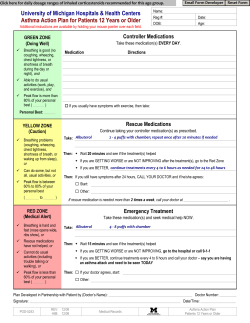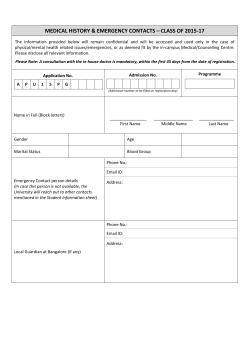
methylphenidate (Ritalin®, Ritalin SR®)
Methylphenidate (IR/SR) Using methylphenidate (Ritalin®, Ritalin SR®) in Children and Adolescents Overview Methylphenidate (Ritalin®, Ritalin SR®, and generic forms) belongs to a group of medications called stimulants. It is used to treat attention deficit/hyperactivity disorder (AD/HD). What is methylphenidate used for? Methylphenidate is approved by Health Canada for treating AD/HD in adolescents and children age six and over. It is used to improve the mental and behavioral symptoms of AD/HD, which includes short attention span, impulsive behaviour, and hyperactivity. Your doctor may be using this medication for another reason. If you are unclear why this medication is being prescribed, please ask your doctor. How does methylphenidate work? Methylphenidate works by increasing the activity of the brain chemicals (neurotransmitters) called dopamine, and to a lesser extent, norepinephrine. This medication activates areas of the brain that control impulsive actions, attention and body movements, thereby improving symptoms of AD/HD. How well does methylphenidate work in children and adolescents? Methylphenidate does not cure AD/HD. It aims to improve functioning by reducing core AD/HD symptoms such as the inability to pay attention, impulsive behaviours, and hyperactivity. Methylphenidate improves core AD/HD symptoms in approximately three-quarters of children and adolescents. It can also help you tolerate frustration better and improve social and peer relationships. It is expected that your overall functioning will improve substantially. Whenever possible, adding behavioral management strategies (for example: rewarding good behaviour, teaching problemsolving techniques) to methylphenidate increases the chance for benefit. If you do not experience a significant improvement with methylphenidate at a younger age, it does not mean that methylphenidate will not work later on in life. How should methylphenidate be taken? These forms of methylphenidate come in tablets that are taken by mouth. Your doctor will determine how much you should take, according to your own needs. If you are starting treatment with methylphenidate, it should be taken everyday (7 days a week). This lets your body to get used to the medication, and helps to determine if and when the medication is working in different settings and as observed by different people. The two forms of methylphenidate discussed in this handout are: short-acting (Ritalin®) and intermediate-acting (Ritalin SR®). Generic versions of these medications are also available. Each dose of short-acting methylphenidate Methylphenidate (Ritalin®, Ritalin SR®) ©Apr 2015 Child & Adolescent Mental Health Programs, BC Mental Health & Substance Use Services, 4500 Oak Street, Vancouver, B.C., Canada V6H 3N1 Page 1 of 4 releases medication right away and lasts for about 4 hours. Usually, it is taken two to three times daily. Each dose of intermediate-acting methylphenidate releases medication slowly over a longer period of time, and lasts for about 6 hours. Usually, it is taken once or twice daily. Sometimes your doctor may prescribe you short-acting methylphenidate to take in addition to longer acting forms of methylphenidate. If this is the case, make sure you understand what to expect from the different forms, and how to take them properly. The intermediate-acting methylphenidate tablets (Ritalin SR®) should be swallowed whole with liquids, and should never be crushed or chewed. When will methylphenidate start working? Your doctor will increase the dose of the medication slowly to find the dose that gives optimal benefit with minimal side effects. Some of the benefits of methylphenidate are noticeable within the first couple days of starting the medication. Symptoms will only improve when there is enough medication in the body. Once the medication wears off at the end of the day, symptoms of AD/HD can return. Your doctor will adjust the amount and timing of each dose according to your needs. For example, a dose may be timed so that there is enough medication in your body during key subjects in school (like math), times of day when you have the most difficulty, and transition periods (like recess or driving home). How long do I have to take methylphenidate? Different people take methylphenidate for different lengths of time. Whether or not you need medication should be reevaluated from time to time. Some people only require this medication during particular times of their life such as when they are in school, while some people continue to benefit from this medication for many years. Your doctor may suggest that you take a “drug holiday” from the medication for a month in the summer to see if you still need it, to optimize growth, and to minimize the body getting too used to the medication. Is methylphenidate addictive? When used properly as directed by your doctor, methylphenidate is not addictive. In general, people with AD/HD may be at an increased risk to abuse substances over the long run. By effectively treating AD/HD, patients may be less likely to abuse substances than those who do not take medications to help manage AD/HD. What are the side effects of methylphenidate and what should I do if I get them? You have been prescribed methylphenidate because your doctor has determined that the benefits of this medication are greater than the risks of you taking it. However, as with most medications, side effects may occur. These effects are usually more common when starting a medication or after a dose increase. Most side effects are mild and almost always decrease with time. It is also possible to experience a side effect that you feel is serious or long-lasting. If this occurs, speak to your doctor about ways to manage the side effects at your next appointment. On the next page are some of the more common side effects of taking this medicine. In brackets are suggested ways to lessen these effects. Methylphenidate (Ritalin®, Ritalin SR®) ©Apr 2015 Child & Adolescent Mental Health Programs, BC Mental Health & Substance Use Services, 4500 Oak Street, Vancouver, B.C., Canada V6H 3N1 Page 2 of 4 Common side effects If any of these side effects bother you or are a change from your usual pattern, please discuss them with your doctor, nurse or pharmacist. For more suggestions on managing common side effects, see our handout “Managing stimulant medication in children and adolescents”. • • • • • • • • Loss of appetite, weight loss (take the medication with breakfast, drink a smoothie or high protein drink or Boost at lunch, and have a major meal when the medication wears off) Trouble sleeping (try taking the last dose of the day at an earlier time; starting a bedtime routine; or try adding melatonin 3 – 6 mg taken 30 minutes before bedtime) Nausea, vomiting, stomach aches (this is often a sign of hunger, try eating something) Stuffy nose (try using a saline nasal spray) Fast heart rate (discuss this with your doctor) Irritability, agitation, energized feelings, nervousness (avoid caffeine from colas, coffee, or tea) Dry mouth (try increasing fluid intake; or chewing sugarless gum or sucking on hard sugar-free candies) Headaches (this usually decreases after using medication for 1-3 weeks. This may also be a sign of hunger. Try eating or drinking.) Potentially serious but uncommon side effects (uncommon side effects occurring in less than 5% of patients) There are risks involved with taking any medication. Make sure you have had a conversation with your doctor about the potentially serious effects of methylphenidate. Contact your doctor IMMEDIATELY if you have any of these potentially serious side effects: • • • • • • • Skin rash Persistent head throbbing Appearance or worsening of vocal or motor tics, such as shrugging, blinking, head turning, muscle twitches, and throat clearing Psychiatric effects such as agitation; prolonged sadness; seeing, hearing, or feeling things that are not there; or other unusual changes in mood (discuss this with your doctor) Thoughts of self harm, hostility or suicide (discuss this with your doctor) Delay in growth (Your doctor will monitor your growth and may adjust the therapy as necessary.) Painful and prolonged erections of the penis (priapism). If you develop priapism, seek medical help right away. Because of the potential for lasting damage, priapism should be evaluated by a doctor immediately. There have been concerns that methylphenidate may increase the risk for heart problems in children and adolescents. However, studies have shown that rates of sudden death (from a heart problem) are similar between children taking stimulant medications and those who did not take the medication. Nevertheless, this may be a concern for children with pre-existing heart conditions, heart defects, or who undergo strenuous exercise. Methylphenidate should be used with caution in patients who are at a higher risk for heart problems. What precautions should my doctor and I be aware of when taking methylphenidate? Several medications can interact with methylphenidate, including some cough and cold medications; monoamine oxidase inhibitors such as selegiline (Eldepryl®) or phenelzine (Nardil®), and several others. If you are (or begin) taking any other prescription or over-the-counter medications, be sure to check with your doctor or pharmacist to see if they are safe to use. Your doctor may need to change the doses of your medication(s) or monitor you carefully for side effects if you take certain other medications. It is important to tell your doctor if you: • • • have heart conditions or a family history of early heart disease or sudden death have structural heart defects or hardening of blood vessels (atherosclerosis) have an overactive thyroid Methylphenidate (Ritalin®, Ritalin SR®) ©Apr 2015 Child & Adolescent Mental Health Programs, BC Mental Health & Substance Use Services, 4500 Oak Street, Vancouver, B.C., Canada V6H 3N1 Page 3 of 4 • • • • • • • • • • • have problems with fainting, dizziness, chest pain or irregular heart beat have high blood pressure have extreme exercise demands have a seizure disorder that is not well controlled have hallucinations (seeing or hearing things that are not there) have psychiatric conditions such as depression or bipolar disorder have any changes in mood or thoughts of self harm have glaucoma (an eye disease) use alcohol to excess or street drugs have allergies or bad reactions to methylphenidate or any other medications are currently pregnant (or plan to become pregnant) or are breast-feeding What special instructions should I follow while using methylphenidate? • • Keep all appointments with your doctor and the laboratory. Your doctor may order certain assessments and tests (for example: reports from teachers, AD/HD rating scales, height, weight, pulse, blood pressure, electrocardiogram (EKG)) to check how you are responding to methylphenidate. Do not allow anyone else to use your medication. What should I do if I forget to take a dose of methylphenidate? If you take methylphenidate regularly and you forget to take it, take it as soon as you remember. If it is more than 4 hours after your regularly scheduled dose, skip the missed dose and continue with your regular schedule. Do NOT double your next dose. What storage conditions are needed for methylphenidate? ¾ ¾ Store this medication at room temperature away from moisture and heat (e.g., not in the bathroom). Keep this medication out of reach and sight of children. You may wish to share this information with your family members to help them to understand your treatment options. Since every person's needs are different, it is important that you follow the advice provided to you by your own doctor, nurse and/or pharmacist and speak to them if you have any questions about this medication. Developed by the health care professionals of Child & Adolescent Mental Health Programs and reviewed by the staff of the Kelty Mental Health Resource Centre. Methylphenidate (Ritalin®, Ritalin SR®) ©Apr 2015 Child & Adolescent Mental Health Programs, BC Mental Health & Substance Use Services, 4500 Oak Street, Vancouver, B.C., Canada V6H 3N1 Page 4 of 4
© Copyright 2025









